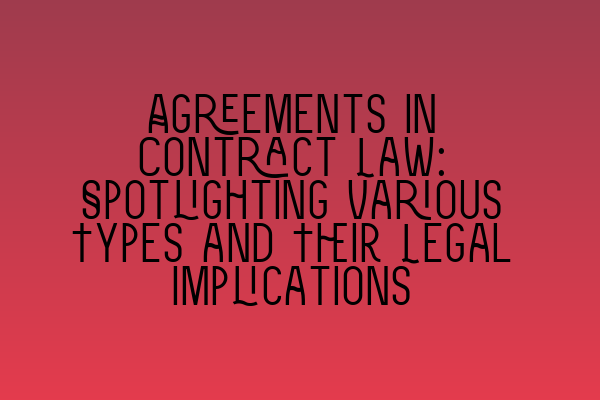Agreements in Contract Law: Spotlighting Various Types and Their Legal Implications
In the vast realm of contract law, agreements play a crucial role. An agreement is essentially a legally binding arrangement between two or more parties, outlining the terms and obligations that each party must adhere to. However, it’s important to understand that not all agreements are created equal, as they can take various forms and have different legal implications.
In this blog post, we will shine a spotlight on different types of agreements within contract law and delve into their legal implications. Whether you are a solicitor, law student, or simply interested in the intricacies of contract law, this article is packed with valuable insights.
1. Express Agreements: The Written Words
One common type of agreement is an express agreement, which is typically in written form. These agreements explicitly articulate the terms and conditions that the parties have mutually agreed upon. Express agreements are highly valued in contract law as they provide clear evidence of each party’s intentions. They help mitigate misunderstandings and disputes that may arise in the future, providing a solid foundation for the enforcement of contractual obligations.
To better understand the concept of express agreements and their legal significance, check out this article on SQE 1 Practice Exam Questions.
2. Implied Agreements: The Unspoken Understandings
Not all agreements are explicitly stated in writing. Sometimes, parties may enter into agreements based on their conduct, verbal communications, or established practices. These are known as implied agreements or contracts implied in fact. Implied agreements often rely on the actions and behavior of the parties involved to infer their mutual intentions.
To gain a deeper understanding of implied agreements and how they are interpreted within the legal framework, take a look at this comprehensive resource on practice mocks FLK1 FLK2.
3. Unilateral Agreements: One Party, One Promise
When one party makes a promise or an offer that requires the performance of the other party, a unilateral agreement is formed. In this type of agreement, only one party is obligated to fulfill their promise, while the other party is not required to take any immediate action. Unilateral agreements are often utilized in situations where one party seeks a specific action from the other party, such as a reward for the completion of a task or finding a lost item.
For a closer look at the legal aspects and examples of unilateral agreements, SQE 2 Preparation Courses provide comprehensive insights.
4. Bilateral Agreements: Mutual Promises and Obligations
The majority of agreements fall under the category of bilateral agreements. In a bilateral agreement, both parties involved make promises or commitments that are legally binding. Each party has not only rights but also obligations that they must fulfill to maintain the validity of the agreement. Bilateral agreements are the most common type of contracts and are often used in commercial transactions, employment contracts, and leases.
If you’re interested in diving deeper into the details of bilateral agreements, SQE 1 Preparation Courses offer comprehensive guidance.
5. Verbal Agreements: The Power of Spoken Words
Verbal agreements, as the name suggests, are agreements that are solely based on oral communication. These agreements lack the written documentation found in express agreements. While verbal agreements can still be legally binding, they often face challenges when it comes to proving the terms and conditions agreed upon. Therefore, it is advisable to reduce verbal agreements to writing whenever possible.
To learn more about the challenges and legalities surrounding verbal agreements, refer to this insightful article on SRA SQE Exam Dates.
In conclusion, agreements are the building blocks of contract law, defining the rights and obligations between parties involved. Whether it’s an express agreement, implied agreement, unilateral agreement, bilateral agreement, or verbal agreement, each type carries its own legal implications. Understanding the nuances and differences between these various types of agreements is crucial for legal professionals and individuals navigating the complexities of contract law.
If you found this article informative and would like to test your knowledge further, why not engage with SQE 1 Practice Mocks FLK1 FLK2 and SQE 1 Practice Exam Questions to enhance your understanding?
If you’re preparing for the SQE 2 examination, SQE 2 Preparation Courses can offer invaluable guidance and support.
Remember, agreements in contract law are the foundation of legally binding relationships. Whether they are written or verbal, express or implied, understanding the intricacies of different agreement types is the key to successful contract negotiations and enforcement.
